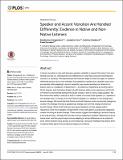Speaker and accent variation are handled differently : evidence in native and non-native listeners
Date
16/06/2016Metadata
Show full item recordAbstract
Listeners are able to cope with between-speaker variability in speech that stems from anatomical sources (i.e. individual and sex differences in vocal tract size) and sociolinguistic sources (i.e. accents). We hypothesized that listeners adapt to these two types of variation differently because prior work indicates that adapting to speaker/sex variability may occur pre-lexically while adapting to accent variability may require learning from attention to explicit cues (i.e. feedback). In Experiment 1, we tested our hypothesis by training native Dutch listeners and Australian-English (AusE) listeners without any experience with Dutch or Flemish to discriminate between the Dutch vowels /I/ and /ε/ from a single speaker. We then tested their ability to classify /I/ and /ε/ vowels of a novel Dutch speaker (i.e. speaker or sex change only), or vowels of a novel Flemish speaker (i.e. speaker or sex change plus accent change). We found that both Dutch and AusE listeners could successfully categorize vowels if the change involved a speaker/sex change, but not if the change involved an accent change. When AusE listeners were given feedback on their categorization responses to the novel speaker in Experiment 2, they were able to successfully categorize vowels involving an accent change. These results suggest that adapting to accents may be a two-step process, whereby the first step involves adapting to speaker differences at a pre-lexical level, and the second step involves adapting to accent differences at a contextual level, where listeners have access to word meaning or are given feedback that allows them to appropriately adjust their perceptual category boundaries.
Citation
Kriengwatana , B , Terry , J , Chládková , K & Escudero , P 2016 , ' Speaker and accent variation are handled differently : evidence in native and non-native listeners ' , PLoS One , vol. 11 , no. 6 , 0156870 . https://doi.org/10.1371/journal.pone.0156870
Publication
PLoS One
Status
Peer reviewed
ISSN
1932-6203Type
Journal article
Collections
Items in the St Andrews Research Repository are protected by copyright, with all rights reserved, unless otherwise indicated.

